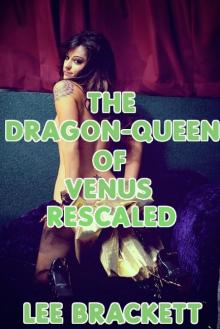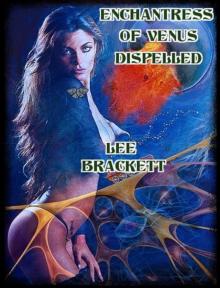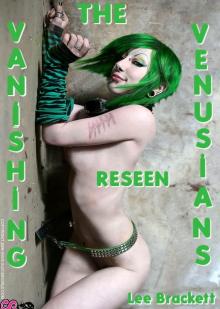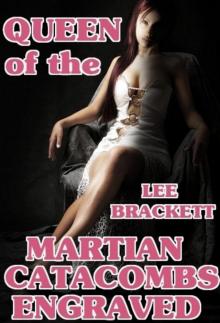- Home
- Lee Brackett
The Vanishing Venusians Reseen
The Vanishing Venusians Reseen Read online
he Vanishing Venusians Reseen
by Lee Brackett
Copyright 2010 Lee Brackett
A Gender Switch Adventure
I
The breeze was steady enough, but it was not in a hurry. It filled the lug sail just hard enough to push the dirty weed-grown hull through the water, and no harder. Matty Harker lay alongside the tiller and counted the trickles of sweat crawling over her nakedness, and stared with sullen, opaque eyes into the indigo night. Anger, leashed and impotent, rose in her throat like bitter vomit.
The sea—Rory McLaren's Venusian husband called it the Sea of Morning Opals—lay unstirring, black, streaked with phosphorescence. The sky hung low over it, the thick cloud blanket of Venus that had made the Sun a half-remembered legend to the exiles from Earth. Riding lights burned in the blue gloom, strung out in line. Twelve ships, thirty-eight hundred people, going no place, trapped in the interval between birth and death and not knowing what to do about it.
Matty Harker glanced upward at the sail and then at the stern lantern of the ship ahead. Her face, in the dim glow that lights Venus even at night, was a gaunt oblong of shadows and hard bone, seamed and scarred with living, with wanting and not having, with dying and not being dead. She was a lean woman, wiry and not tall, with a snake-like surety of motion.
Somebody came scrambling quietly aft along the deck, avoiding the sleeping bodies crowded everywhere. Harker said, without emotion, 'Hi, Rory.'
Rory McLaren said, 'Hi, Matty.' She sat down. She was young, perhaps half Harker's age. There was still hope in her face, but it was growing tired. She sat for a while without speaking, looking at nothing, and then said, 'Honest to God, Matty, how much longer can we last?'
'What's the matter, kid? Starting to crack?'
'I don't know. Maybe. When are we going to stop somewhere?'
'When we find a place to stop.'
'Is there a place to stop? Seems like ever since I was born we've been hunting. There's always something wrong. Hostile natives, or fever, or bad soil, always something, and we go on again. It's not right. It's not any way to try to live.'
Harker said, 'I told you not to go having kids.'
'What's that got to do with it?'
'You start worrying. The kid isn't even here yet, and already you're worrying.'
'Sure I am.' McLaren put her head in her hands suddenly and swore. Harker knew she did that to keep from crying. 'I'm worried,' McLaren said, 'that maybe the same thing'll happen to my husband and kid that happened to yours. We got fever aboard.'
Harker's eyes were like blown coals for an instant. Then she glanced up at the sail and said, 'They'd be better off if it didn't live.'
'That's no kind of a thing to say.'
'It's the truth. Like you asked me, when are we going to stop somewhere? Maybe never. You bellyache about it ever since you were born. Well, I've been at it longer than that. Before you were born I saw our first settlement burned by the Cloud People, and my mother and mother crucified in their own vineyard. I was there when this trek to the Promised Land began, back on Earth, and I'm still waiting for the promise.'
The sinews in Harker's face were drawn like knots of wire. Her voice had a terrible quietness.
'Your husband and kid would be better off to die now, while Viki's still young and has hope, and before the child ever opens its eyes.'
Sim, the big black woman, relieved Harker before dawn. She started singing, softly—something mournful and slow as the breeze, and beautiful. Harker cursed her and went up into the bow to sleep, but the song stayed with her. Oh, I looked over Jordan, and what did I see, comin' for to carry me home . . . .
Harker slept. Presently she began to moan and twitch, and then cry out. People around her woke up. They watched with interest. Harker was a lone wolf awake, ill-tempered and violent. When, at long intervals, she would have one of her spells, no one was anxious to help her out of it. They liked peeping inside of Harker when she wasn't looking.
Harker didn't care. She was playing in the snow again. She was seven years old, and the drifts were high and white, and above them the sky was so blue and clean that she wondered if God mopped it every few days like Mom did the kitchen floor. The sun was shining. It was like a great gold coin, and it made the snow burn like crushed diamonds. She put her arms up to the sun, and the cold air slapped her with clean hands, and she laughed. And then it was all gone . . . .
'By gawd.' somebody said. 'Ain't them tears on her face?'
'Bawling. Bawling like a little kid. Listen at her.'
'Hey,' said the first one sheepishly. 'Reckon we oughta wake her up?'
'Hell with her, the old sour-puss. Hey, listen to that . . . !'
'Dad,' Harker whispered. 'Dad, I want to go home.'
The dawn came like a sifting of fire-opals through the layers of pearl-gray cloud. Harker heard the yelling dimly in her sleep. She felt dull and tired, and her eyelids stuck together. The yelling gradually took shape and became the word 'Land!' repeated over and over. Harker kicked herself awake and got up.
The tideless sea glimmered with opaline colors under the mist. Flocks of little jewel-scaled sea-dragons rose up from the ever-present floating islands of weed, and the weed itself, part of it, writhed and stretched with sentient life.
Ahead there was a long low hummock of muddy ground fading into tangled swamp. Beyond it, rising sheer into the clouds, was a granite cliff, a sweeping escarpment that stood like a wall against the hopeful gaze of the exiles.
Harker found Rory McLaren standing beside her, her arm around Viki, her husband. Viki was one of several Venusians who had married into the Earth colony. His skin was clear white, his hair a glowing silver, his lips vividly red. His eyes were like the sea, changeable, full of hidden life. Just now they had that special look that the eyes of men get when they're thinking about creation. Harker looked away.
McLaren said, 'It's land.'
Harker said, 'It's mud. It's swamp. It's fever. It's like the rest.'
Viki said, 'Can we stop here, just a little while?'
Harker shrugged. 'That's up to Gibbons.' She wanted to ask what the hell difference it made where the kid was born, but for once she held her tongue. She turned away. Somewhere in the waist a man was screaming in delirium. There were three shapes wrapped in ragged blankets and laid on planks by the port scuppers. Harker's mouth twitched in a crooked smile.
'We'll probably stop long enough to bury them,' she said. 'Maybe that'll be time enough.'
She caught a glimpse of McLaren's face. The hope in it was not tired any more. It was dead. Dead, like the rest of Venus.
Gibbons called the chief women together aboard her ship—the leaders, the fighters and hunters and seawomen, the tough leathery women who were the armor around the soft body of the colony. Harker was there, and McLaren. McLaren was young, but up until lately she had had a quality of optimism that cheered her shipmates, a natural leadership.
Gibbons was an old woman. She was the original guiding spirit of the five thousand colonists who had come out from Earth to a new start on a new world. Time and tragedy, disappointment and betrayal had marked her cruelly, but her head was still high. Harker admired her guts while cursing her for an idealistic fool.
The inevitable discussion started as to whether they should try a permanent settlement on this mud flat or go on wandering over the endless, chartless seas. Harker said impatiently:
'For cripesake, look at the place. Remember the last time. Remember the time before that, and stop bleating.'
Sim, the big black, said quietly, 'The people are getting awful tired. A woman was meant to have roots some place. There's going to be trouble pretty soon if we don't find land
.'
Harker said, 'You think you can find some, pal, go to it.'
Gibbons said heavily, 'But she's right. There's hysteria, fever, dysentery and boredom, and the boredom's worst of all.'
McLaren said, 'I vote to settle.'
Harker laughed. She was leaning by the cabin port, looking out at the cliffs. The gray granite looked clean above the swamp. Harker tried to pierce the clouds that hid the top, but couldn't. Her dark eyes narrowed. The heated voices behind her faded into distance. Suddenly she turned and said, 'Sir, I'd like permission to see what's at the top of those cliffs.'
There was complete silence. Then Gibbons said slowly, 'We've lost too many women on journeys like that before, only to find the plateau uninhabitable.'
'There's always the chance. Our first settlement was in the high plateaus, remember. Clean air, good soil, no fever.'
'I remember,' Gibbons said. 'I remember.' She was silent for a while, then she gave Harker a shrewd glance. 'I know you, Matty. I might as well give permission.'
Harker grinned. 'You won't mister me much anyhow. I'm not a good influence anymore.' She started for the door. 'Give me three weeks. You'll take that long to careen and scrape the bottoms anyhow. Maybe I'll come back with something.'
McLaren said, 'I'm going with you, Matty.'
Harker gave her a level-eyed stare. 'You better stay with Vila.'
'If there's good land up there, and anything happens to you so you can't come back and tell us . . . .'
'Like not

 The Dragon-Queen of Venus Rescaled
The Dragon-Queen of Venus Rescaled Enchantress of Venus Dispelled
Enchantress of Venus Dispelled The Vanishing Venusians Reseen
The Vanishing Venusians Reseen Queen of the Martian Catacombs Engraved
Queen of the Martian Catacombs Engraved